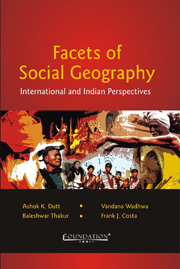Book contents
- Frontmatter
- Contents
- Foreword
- Preface
- Acknowledgements
- List of Contributors
- I Introductory Framework: Allen G. Noble's Contribution to Social Geography
- II Conceptual and Theoretical Basis of Social Geography
- III Social Geography from a Global Perspective
- IV Social Geography in the Indian Context
- V Indian Social Geography: City and State Context
- 24 Health Infrastructure and Healthcare Services in Uttar Pradesh
- 25 Status of Women in Aligarh Muslim University, India
- 26 Social Geographies of Collective Action: A Case Study of India's Chipko Movement
- 27 Sacredscape and Manescape: The Sacred Geography of Gaya, India
- 28 Madurai: A Holy City of Pilgrimage
- 29 Assessment and Dynamics of Urban Growth in the City of Kolkata
- 30 Socioeconomic and Demographic Conditions of the Slums of Hyderabad
- 31 Writings of Mirza Ghalib: A Study in Literary Geography
- 32 Geographic Images of Old Delhi through Literature
- 33 Spatial and Temporal Characteristics of Elite Residential Colonies in Delhi, 1982–2004
- Index
33 - Spatial and Temporal Characteristics of Elite Residential Colonies in Delhi, 1982–2004
from V - Indian Social Geography: City and State Context
Published online by Cambridge University Press: 05 June 2012
- Frontmatter
- Contents
- Foreword
- Preface
- Acknowledgements
- List of Contributors
- I Introductory Framework: Allen G. Noble's Contribution to Social Geography
- II Conceptual and Theoretical Basis of Social Geography
- III Social Geography from a Global Perspective
- IV Social Geography in the Indian Context
- V Indian Social Geography: City and State Context
- 24 Health Infrastructure and Healthcare Services in Uttar Pradesh
- 25 Status of Women in Aligarh Muslim University, India
- 26 Social Geographies of Collective Action: A Case Study of India's Chipko Movement
- 27 Sacredscape and Manescape: The Sacred Geography of Gaya, India
- 28 Madurai: A Holy City of Pilgrimage
- 29 Assessment and Dynamics of Urban Growth in the City of Kolkata
- 30 Socioeconomic and Demographic Conditions of the Slums of Hyderabad
- 31 Writings of Mirza Ghalib: A Study in Literary Geography
- 32 Geographic Images of Old Delhi through Literature
- 33 Spatial and Temporal Characteristics of Elite Residential Colonies in Delhi, 1982–2004
- Index
Summary
Nature of Problem
Land in Delhi is used for a variety of purposes among which residential land use is most important. It accounts for a large part of built-up area of the city with varying patterns of population density and housing quality. Being the largest user of space, residential houses are heterogeneous, immobile, complicated and expensive. The houses are occupied by households belonging to different social and economic classes, depending on their capacity to pay the housing market. Therefore, in Indian cities, the segregation of people into different neighbourhoods on the basis of social characteristics, such as ethnicity, occupation or income is a fairly common feature. The spatial distribution of housing characteristics, the nature of housing markets and the neighbourhood communities within cities have become one of the major research foci of urban social geography (Cadwallader, 1996, p. 241).
Over the last three decades, most cities in India, including Delhi, have experienced residential and social polarization in the built-environment and social space resulting into slums and squatter settlements and highstatus residential areas. The net result has been massive inequality and increasing intolerance. Our cities are becoming more divided, increasingly segregated and differentiated across the lines of race, ethnicity, gender, sexuality, ability, class and power (Del Casino, 2009, p. 1). Social geographers are interested in these issues because they deal with organization and contestation of space (Del Casino, 2009, p. 2).
- Type
- Chapter
- Information
- Facets of Social GeographyInternational and Indian Perspectives, pp. 602 - 620Publisher: Foundation BooksPrint publication year: 2012



